Three Versions of Sustainable Tyre Technology
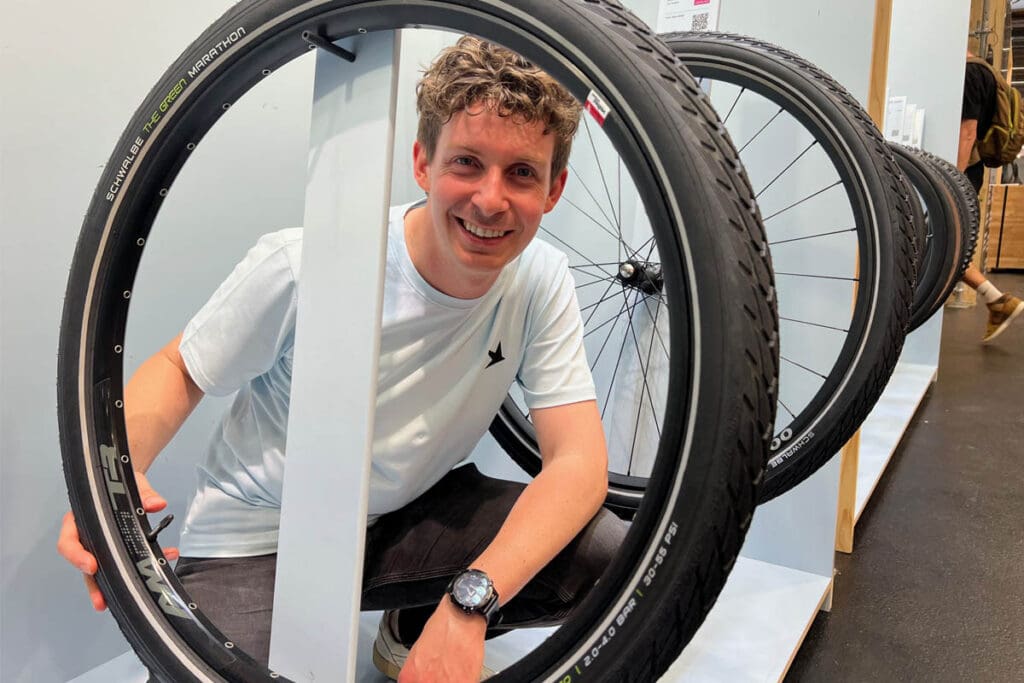
Frankfurt, Germany
Emerging technologies for greater tyre sustainability are approaching the dilemma from very different directions, with at least three manufacturers displaying their solutions at Eurobike 2023.
German manufacturer Schawalbe claimed a Eurobike 2023 sustainability Green Award with its new process to deconstruct bike, car and truck tyres down to their base ingredients and reuse some of that material to make its new Green Marathon tyres.
Alternatively, reTyre, from Norway, was displaying what it claims are the world’s first 100% rubber-free pneumatic tyres, while Maxxis exhibited its Metropass and Metroload series, which now feature tyre carcasses made with recycled nylon from disused fishing nets.
Schwalbe’s Green Marathon range is the first tyre with its own circular production-recycling process and is manufactured from 100% recycled black rubber.
Schwalbe’s head of corporate social responsibility, Felix Jahn, a fourth generation member of the family that founded and has continued to own the company for 101 years, said it has been accumulating and storing used bike, car and truck tyres for the past eight years, while working with a number of partners to develop the process of breaking them down into their main ingredients.
It total, each Green Marathon tyre consists of 70% recycled and renewable materials, including bead core wire made of recycled steel.
The use of recycled rubber not only reduces the amount of new rubber needed for the manufacturing process, it meant the tyre and its construction was 98% pollutant free, according to a statement from the Eurobike Awards 2023.
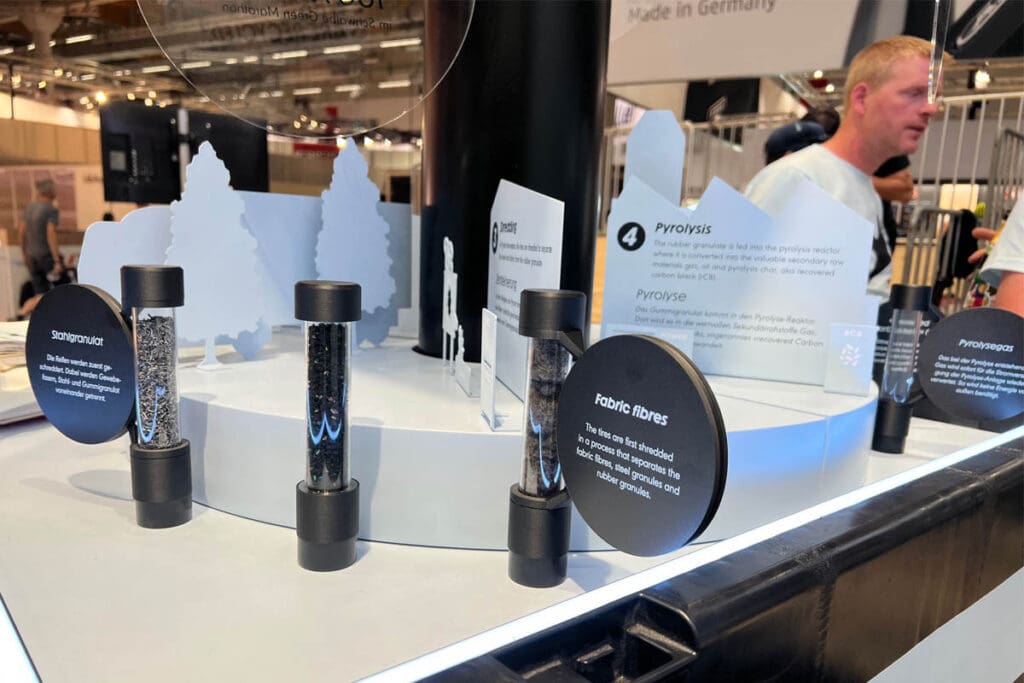
Production of the Green Marathon creates 34% fewer emissions than Schwalbe’s Marathon tyre, which has been the company’s best seller since it was launched four decades ago but will now be superseded by its more environmentally friendly successor.
However, Felix says Schwalbe aims to improve that emission reduction by another 10% over the next 12 months as it further refines its recycling and reuse methods.
He said it has been four years of hard work to develop the method of processing used tyres – to separate the granulated carbon black from the oil and metal fragments – and to develop the Green Marathon range.
While the black rubber and metal are reused to create new Green Marathon tyres, recycling specialist Pyrum Innovations AG uses the oil to manufacture plastic fibres used by garment company Vaude to produce sportwear.
Felix said when Schwalbe first embarked on the process with Pyrum and the Cologne University of Applied Sciences, they had expected to produce entry-level tyres.
However, the level of performance they achieved with the prototype tyres convinced them the new tyres should be an updated Marathon range.
He said the Green Marathon tyres had less rolling resistance, were longer wearing and quieter than the Marathon models they replace.
The Green Marathon is designed for city and touring bike, including e-bikes.
Green Marathon tyres were available on the market immediately after the launch and are distributed in Australia by BikeBox.
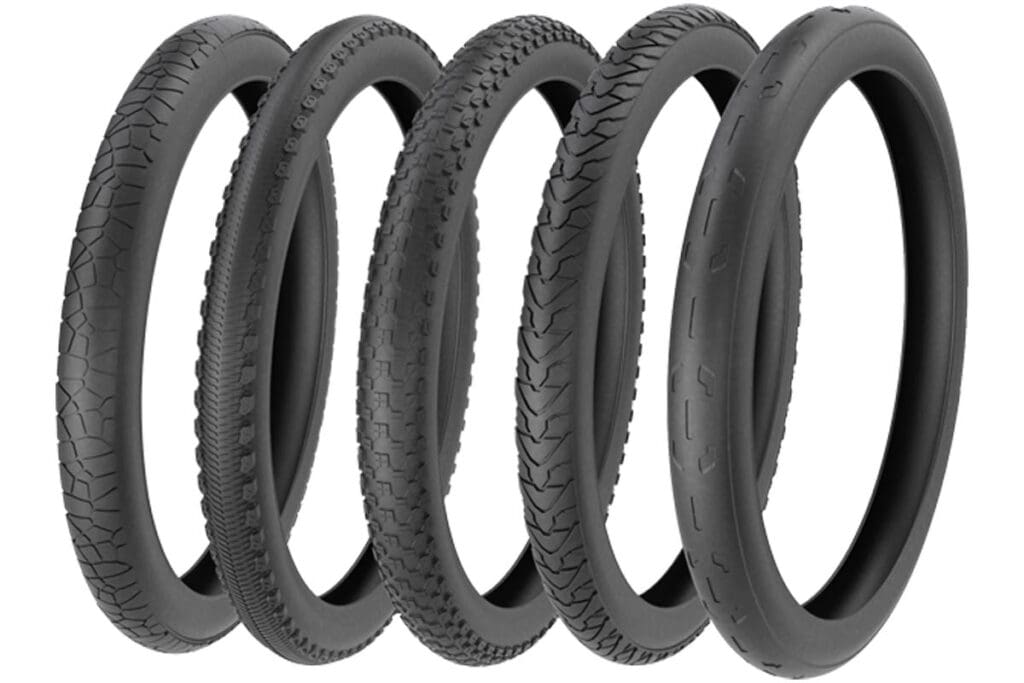
reTyre’s Thermoplastic Solution
reTyre’s new sustainable pneumatic tyres are produced from a thermoplastic elastomer that can be broken down at relatively low temperatures and used to make new tyres.
reTyre brand designer Friedemann Ohse said amid increasingly tight restrictions on tyre disposal in the EU, the thermoplastic technology provides a solution to the 1.8 billion tyres removed from vehicles and disposed of each year because there has not been an any options to recycle them.
He said production of the thermoplastic tyres not only produced 82% less CO2 compared to conventional rubber tyres, they don’t need water for the production process and, unlike other tyres, there’s no need for a canvas carcass.
In addition, the finished product is less prone to abrasion than rubber tyres, a key point given 30% of microplastics in the oceans are coming from tyres.
At the same time, their riding performance is as good, and sometimes better, than the rubber alternative.
Friedemann said while it initially costs more to produce thermoplastic tyres compared to rubber, that added cost is negated once the materials were kept in the circular production process.
“The elastomers have been used in other industries, but not so much in the bike sector,” he added.
“reTyre has found a way to mass produce the tyres, which saves a lot of time compared to 3D printing. It has patents active for the injection process and the equipment used, with more patents pending.
“We are realising there’s great opportunity for other companies to get involved to get a high volume of tyres out there.
“The biggest bike manufacturers are coming to us saying they want to work with us.”
Friedemann said it is also easier to add colours to the thermoplastic tyres, as well as additives to make them glow and luminescent.
reTyre last year attracted a lot of attention at Eurobike 2022 when it displayed its latest generation of modular zip-on treads enabling owners to quickly and easily fit a tread configuration that suits road conditions without the need to remove the wheel.
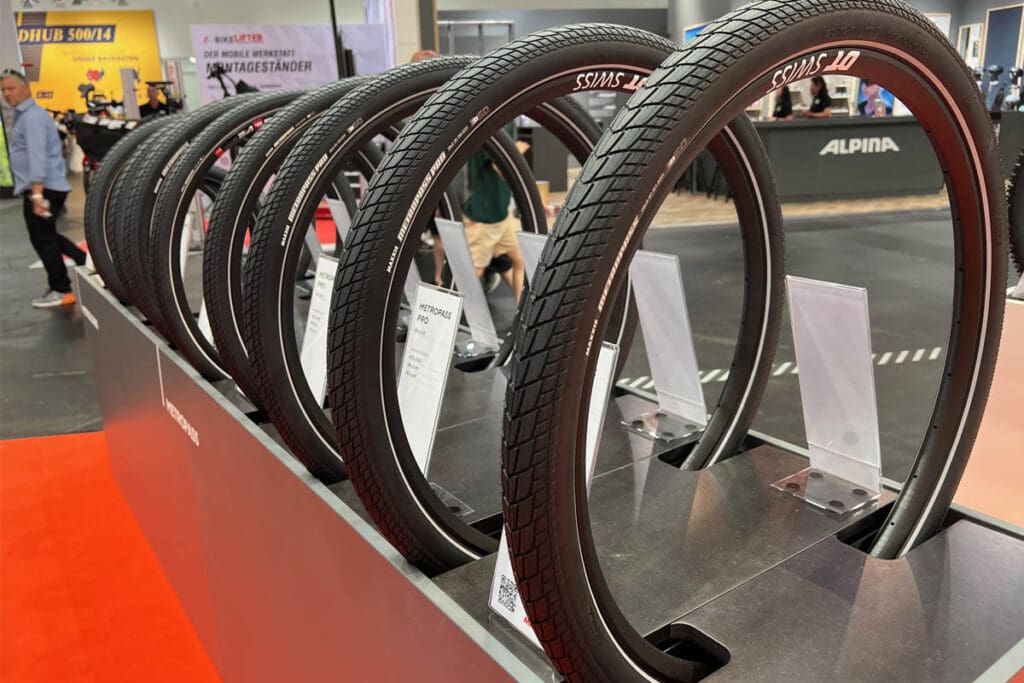
Net Gains for Sustainability
From this month, all Maxxis Metropass, MetroLoads and MTB wired tyres will be manufactured with carcasses comprising nylon sourced from disused fishing nets.
The netting material is processed by Taiwan company Formosa Taffeta to create a recycled nylon 6 yarn called Seawastex.
According to a statement by Maxxis, there are thousands of tons of old or defective fishing nets are floating in the world’s oceans, after being lost or intentionally discarded.
It says these ‘ghost nets’ become deadly traps for fish and other marine life, and can be washed up on coasts in large quantities.
The Seawastex manufacturing process breaks down all of the old fishing nets into nylon granules and spins them into high-quality nylon threads with exactly the same properties as new material.
As a result of the recycling opportunities, it has been proposed fishermen could be able to exchange their old nets for a new one free of charge, to ensure net aren’t discarded at sea.
Maxxis says it will expand its use of Seawastex by incorporating it into its EXO carcass later this year.rcass with Seawastex nylon will also be manufactured.
The Maxxis exhibit at Eurobike also showcased its new, wider models of Metropass and Metroload, as well as its new Maxx Speed XC tyre with a 25% reduction in rolling resistance.
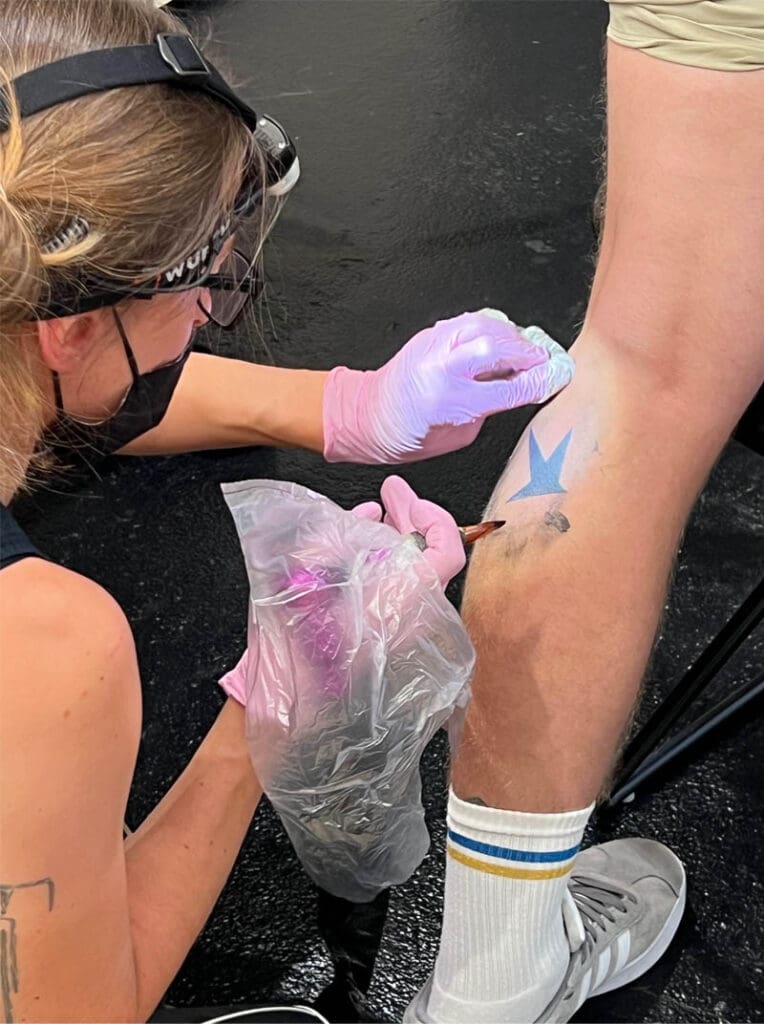
Free Tattoo Promotion
How dedicated are your customers to your brands?
Schwalbe took a rather hardcore approach to its promotion at last month’s Eurobike 2023, hiring a tattoo artist to offer free tats to anyone keen to have the company’s logo inked onto their skin.
The artist added the logo onto the arms, legs and even a neck of will participants during the first of two public days at the festival, with another 20 people on the waiting list for the following day.
